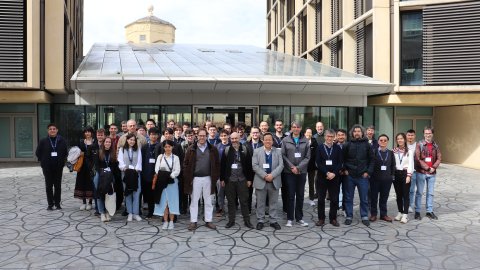Oxford Women and Non-Binary in Mathematics Day 2024: Beyond the Pipeline
Abstract
 The conference ‘Beyond the Pipeline: Women and Non-binary People in Mathematics Day’ will be held at the University of Oxford on the 17th February 2024. This is a joint event between the Mathematrix and the Mirzakhani societies of the University of Oxford. It is kindly funded by the London Mathematical Society and the Mathematical Institute at the University of Oxford, with additional funding from industry sponsors.
The conference ‘Beyond the Pipeline: Women and Non-binary People in Mathematics Day’ will be held at the University of Oxford on the 17th February 2024. This is a joint event between the Mathematrix and the Mirzakhani societies of the University of Oxford. It is kindly funded by the London Mathematical Society and the Mathematical Institute at the University of Oxford, with additional funding from industry sponsors.
The metaphor of the 'leaky pipeline' for the decreasing number of women and other gender minorities in Mathematics is problematic and outdated. It conceals the real reasons that women and non-binary people choose to leave Mathematics. This conference, 'Beyond the Pipeline', aims to encourage women and non-binary people to pursue careers in Mathematics, to promote women and non-binary role models, and to create a community of like-minded people.
Speakers:
- Brigitte Stenhouse, The Open University
- Mura Yakerson, The University of Oxford
- Vandita Patel, The University of Manchester
- Melanie Rupflin, The University of Oxford
- Christl Donnelly, The University of Oxford
The conference will also include:
- A panel discussion on careers in and out of academia
- Talks by early-career speakers
- Poster presentations
- 1:1 bookable appointments with our industry sponsors (Cisco, Jane Street, ING, and Optiver)
- Careers stands with our sponsors and the IMA
More information can be found on our website https://www.oxwomeninmaths2024.co.uk/.
This conference is open to everyone regardless of their gender identity. Registration is via the following google form https://forms.gle/cDGaeJCPbBFEPfDB6 and will close when we have reached capacity. We have limited travel funding to support travel to Oxford from within the UK and you can apply for this on the registration form. The deadline for those applying to give a talk and for those applying for travel funding is the 27th January.
If you have any questions email us at @email.
Characteristic polynomials, the Hybrid model, and the Ratios Conjecture
Abstract
In the 1960s Shanks conjectured that the ζ'(ρ), where ρ is a non-trivial zero of zeta, is both real and positive in the mean. Conjecturing and proving this result has a rich history, but efforts to generalise it to higher moments have so far failed. Building on the work of Keating and Snaith using characteristic polynomials from Random Matrix Theory, the Hybrid model of Gonek, Hughes and Keating, and the Ratios Conjecture of Conrey, Farmer, and Zirnbauer, we have been able to produce new conjectures for the full asymptotics of higher moments of the derivatives of zeta. This is joint work with Chris Hughes.
Asymptotic freeness in tracial ultraproducts
Abstract
I will present novel freeness results in ultraproducts of tracial von Neumann algebras. As a particular case, I will show that if a and b are the generators of the free group F_2, then the relative commutants of a and b in the ultraproduct of the free group factor are free with respect to the ultraproduct trace. The proof is based on a surprising application of Lp-boundedness results of Fourier multipliers in free group factors for p > 2. I will describe applications of these results to absorption and model theory of II_1 factors. This is joint work with Adrian Ioana.
11:00
L-open and l-closed C*-algebras
Abstract
This talk concerns some ideas around the question of when a *-homomorphism into a quotient C*-algebra lifts. Lifting of *-homomorphisms arises prominently in the notions of projectivity and semiprojectivity, which in turn are closely related to stability of relations. Blackadar recently defined the notions of l-open and l-closed C*-algebras, making use of the topological space of *-homomorphisms from a C*-algebra A to another C*-algebra B, with the point-norm topology. I will discuss these properties and present new characterizations of them, which lead to solutions of some problems posed by Blackadar. This is joint work with Dolapo Oyetunbi.
Where Can Advanced Optimization Methods Help in Deep Learning?
Abstract
Modern neural network models are trained using fairly standard stochastic gradient optimizers, sometimes employing mild preconditioners.
A natural question to ask is whether significant improvements in training speed can be obtained through the development of better optimizers.
In this talk I will argue that this is impossible in the large majority of cases, which explains why this area of research has stagnated. I will go on to identify several situations where improved preconditioners can still deliver significant speedups, including exotic architectures and loss functions, and large batch training.
Branching selection particle systems and the selection principle.
Abstract
On sketches and corruptions: devising adaptive randomized iterative methods for large linear systems
Abstract
When the data is large, or comes in a streaming way, randomized iterative methods provide an efficient way to solve a variety of problems, including solving linear systems, finding least square solutions, solving feasibility problems, and others. Randomized Kaczmarz algorithm for solving over-determined linear systems is one of the popular choices due to its efficiency and its simple, geometrically intuitive iterative steps.
In challenging cases, for example, when the condition number of the system is bad, or some of the equations contain large corruptions, the geometry can be also helpful to augment the solver in the right way. I will discuss our recent work with Michal Derezinski and Jackie Lok on Kaczmarz-based algorithms that use external knowledge about the linear system to (a) accelerate the convergence of iterative solvers, and (b) enable convergence in the highly corrupted regime.
14:15
Loop group action on symplectic cohomology
Abstract
For a compact Lie group $G$, its massless Coulomb branch algebra is the $G$-equivariant Borel-Moore homology of its based loop space. This algebra is the same as the algebra of regular functions on the BFM space. In this talk, we will explain how this algebra acts on the equivariant symplectic cohomology of Hamiltonian $G$-manifolds when the symplectic manifolds are open and convex. This is a generalization of the closed case where symplectic cohomology is replaced with quantum cohomology. Following Teleman, we also explain how it relates to the Coulomb branch algebra of cotangent-type representations. This is joint work with Eduardo González and Dan Pomerleano.



